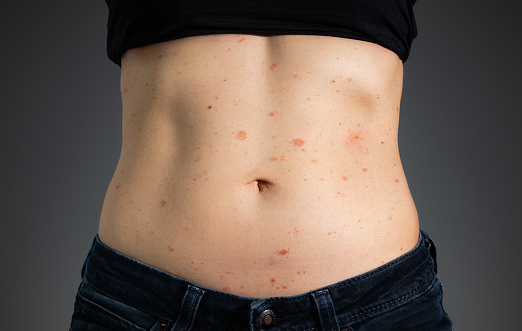What are the symptoms of skin lesions?
The symptoms of skin lesions can vary widely depending on the type, cause, and location of the lesion. Common symptoms include:
- Changes in Skin Color: Lesions may appear as red, pink, brown, black, or other colors different from the surrounding skin.
- Texture Changes: The skin may feel rough, scaly, or lumpy. Lesions can be flat or raised.
- Size and Shape: Skin lesions can vary in size, from small spots to large areas. They may have irregular or well-defined edges.
- Itching: Some lesions cause itching or irritation.
- Pain or Tenderness: Lesions may be painful or tender to the touch.
- Bleeding or Discharge: Some lesions may bleed, ooze, or have a discharge. This can be a sign of an infection or a more serious condition.
- Ulceration: Certain lesions may develop into sores or ulcers.
- Swelling: In some cases, lesions may cause surrounding skin to become swollen.
If you notice any of these symptoms or changes in your skin, it’s important to consult a healthcare provider for a proper diagnosis and appropriate treatment.
What are the causes of skin lesions?
Skin lesions can arise from a variety of causes, including:
- Infections: Bacterial, viral, fungal, or parasitic infections can lead to skin lesions. Examples include impetigo, herpes simplex, ringworm, and scabies.
- Inflammatory Conditions: Conditions like eczema, psoriasis, and dermatitis cause inflammation and result in skin lesions.
- Autoimmune Diseases: Disorders such as lupus and vasculitis can cause lesions due to the immune system attacking healthy skin tissues.
- Allergic Reactions: Allergic responses to substances like certain foods, medications, or chemicals can lead to rashes and lesions.
- Cancer: Skin cancers, including basal cell carcinoma, squamous cell carcinoma, and melanoma, present as lesions on the skin.
- Trauma or Injury: Physical damage to the skin, such as cuts, burns, or abrasions, can result in lesions.
- Genetic Conditions: Some genetic disorders, like genetic skin disorders or birthmarks, can manifest as lesions.
- Chronic Sun Exposure: Prolonged exposure to UV radiation can lead to sunspots or actinic keratosis, which are types of lesions.
- Environmental Factors: Exposure to certain chemicals or pollutants can irritate the skin and lead to lesions.
- Systemic Diseases: Conditions affecting the entire body, such as diabetes or kidney disease, can sometimes manifest as skin lesions.
The exact cause of a skin lesion often requires evaluation by a healthcare provider to determine the appropriate treatment and management.
What is the treatment for skin lesions?
The treatment for skin lesions depends on their underlying cause and type. Here are some common approaches:
- Topical Medications: For conditions like eczema, psoriasis, or fungal infections, topical creams or ointments, such as corticosteroids or antifungals, may be used to reduce inflammation, itching, or infection.
- Oral Medications: Systemic treatments, including oral antibiotics for bacterial infections, antiviral drugs for viral infections, or oral antifungals for more severe fungal infections, may be prescribed.
- Cryotherapy: This involves freezing the lesion with liquid nitrogen to remove it. It’s often used for warts, certain precancerous lesions, and some skin cancers.
- Laser Therapy: Lasers can be used to treat various skin lesions, including vascular lesions, pigmented lesions, and some precancerous conditions.
- Surgical Removal: Surgical excision may be necessary for removing skin cancers, large or persistent lesions, or those that do not respond to other treatments.
- Phototherapy: This treatment uses ultraviolet light to treat certain skin conditions, such as psoriasis and severe eczema.
- Cryotherapy: Involves applying extreme cold to destroy abnormal tissue and is used for warts, precancerous lesions, and some cancers.
- Electrosurgery: This technique uses electrical currents to remove or destroy abnormal skin tissue, often used for lesions like warts or precancerous spots.
- Moisturizers: For conditions like eczema or dry skin, regular use of moisturizers can help soothe and protect the skin.
- Lifestyle Changes: For some conditions, avoiding triggers such as allergens or irritants, practicing good skin hygiene, and sun protection can be part of the treatment strategy.
The treatment plan is tailored to the specific type and cause of the skin lesion and should be determined by a healthcare provider based on a thorough evaluation.

Leave a Reply
You must be logged in to post a comment.